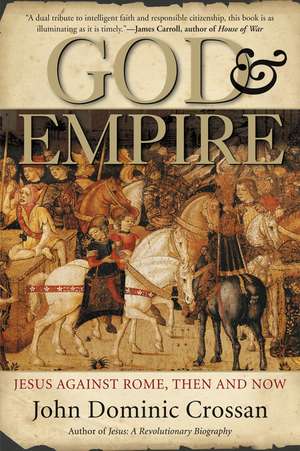God and Empire: Jesus Against Rome, Then and Now
Autor John Dominic Crossanen Limba Engleză Paperback – 25 feb 2008
Using the tools of expert biblical scholarship and a keen eye for current events, bestselling author John Dominic Crossan deftly presents the tensions exhibited in the Bible between political power and God’s justice. Through the revolutionary messages of Jesus and Paul, Crossan reveals what the Bible has to say about land and economy, violence and retribution, justice and peace, and ultimately, redemption. He examines the meaning of “kingdom of God” prophesized by Jesus, and the equality recommended to Paul by his churches, contrasting these messages of peace against the misinterpreted apocalyptic vision from the book of Revelations, that has been co-opted by modern right-wing theologians and televangelists to justify the United State’s military actions in the Middle East.
Preț: 77.68 lei
Nou
Puncte Express: 117
Preț estimativ în valută:
14.87€ • 15.32$ • 12.55£
14.87€ • 15.32$ • 12.55£
Carte disponibilă
Livrare economică 08-22 februarie
Livrare express 25-31 ianuarie pentru 37.17 lei
Preluare comenzi: 021 569.72.76
Specificații
ISBN-13: 9780060858315
ISBN-10: 0060858311
Pagini: 272
Dimensiuni: 135 x 203 x 16 mm
Greutate: 0.25 kg
Editura: HarperCollins Publishers
Colecția HarperOne
ISBN-10: 0060858311
Pagini: 272
Dimensiuni: 135 x 203 x 16 mm
Greutate: 0.25 kg
Editura: HarperCollins Publishers
Colecția HarperOne
Textul de pe ultima copertă
At the heart of the Bible is a moral and ethical call to fight unjust superpowers, whether they are Babylon, Rome, or even America.
From the divine punishment and promise found in Genesis through the revolutionary messages of Jesus and Paul, John Dominic Crossan reveals what the Bible has to say about land and economy, violence and retribution, justice and peace, and, ultimately, redemption. In contrast to the oppressive Roman military occupation of the first century, he examines the meaning of the non-violent Kingdom of God prophesized by Jesus and the equality advocated by Paul to the early Christian churches. Crossan contrasts these messages of peace with the misinterpreted apocalyptic vision from the Book of Revelation, which has been misrepresented by modern right-wing theologians and televangelists to justify U.S. military actions in the Middle East.
In God and Empire Crossan surveys the Bible from Genesis to Apocalypse, or the Book of Revelation, and discovers a hopeful message that cannot be ignored in these turbulent times. The first-century Pax Romana, Crossan points out, was in fact a "peace" won through violent military action. Jesus preached a different kind of peace—a peace that surpasses all understanding—and a kingdom not of Caesar but of God.
The Romans executed Jesus because he preached this Kingdom of God, a kingdom based on peace and justice, over the empire of Rome, which ruled by violence and force. For Jesus and Paul, Crossan explains, peace cannot be won the Roman way, through military victory, but only through justice and fair and equal treatment of all people.
From the divine punishment and promise found in Genesis through the revolutionary messages of Jesus and Paul, John Dominic Crossan reveals what the Bible has to say about land and economy, violence and retribution, justice and peace, and, ultimately, redemption. In contrast to the oppressive Roman military occupation of the first century, he examines the meaning of the non-violent Kingdom of God prophesized by Jesus and the equality advocated by Paul to the early Christian churches. Crossan contrasts these messages of peace with the misinterpreted apocalyptic vision from the Book of Revelation, which has been misrepresented by modern right-wing theologians and televangelists to justify U.S. military actions in the Middle East.
In God and Empire Crossan surveys the Bible from Genesis to Apocalypse, or the Book of Revelation, and discovers a hopeful message that cannot be ignored in these turbulent times. The first-century Pax Romana, Crossan points out, was in fact a "peace" won through violent military action. Jesus preached a different kind of peace—a peace that surpasses all understanding—and a kingdom not of Caesar but of God.
The Romans executed Jesus because he preached this Kingdom of God, a kingdom based on peace and justice, over the empire of Rome, which ruled by violence and force. For Jesus and Paul, Crossan explains, peace cannot be won the Roman way, through military victory, but only through justice and fair and equal treatment of all people.
Recenzii
“A dual tribute to intelligent faith and responsible citizenship, this book is as illuminating as it is timely.” — James Carroll, author of House of War: The Pentagon and the Disastrous Rise of American Power
“This fine study of civilization, culture and transformation presents a complex subject in a clear and powerful way.” — Publishers Weekly
“This book makes the best reading for the most readers of any that Crossan has written.” — Booklist (starred review)
“A wonderfully written and organized treatise... Thoroughly enjoyable and incredibly informative.” — Library Journal
“This fine study of civilization, culture and transformation presents a complex subject in a clear and powerful way.” — Publishers Weekly
“This book makes the best reading for the most readers of any that Crossan has written.” — Booklist (starred review)
“A wonderfully written and organized treatise... Thoroughly enjoyable and incredibly informative.” — Library Journal
Notă biografică
John Dominic Crossan, professor emeritus at DePaul University, is widely regarded as the foremost historical Jesus scholar of our time. He is the author of several bestselling books, including The Historical Jesus, How to Read the Bible and Still Be a Christian, God and Empire, Jesus: A Revolutionary Biography, The Greatest Prayer, The Last Week, and The Power of Parable. He lives in Minneola, Florida.
